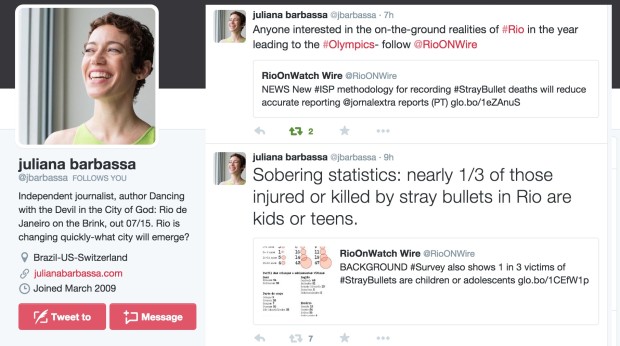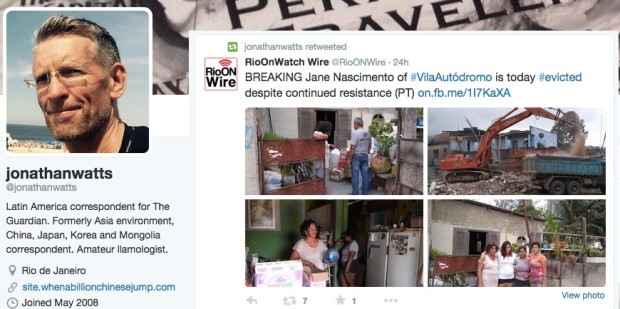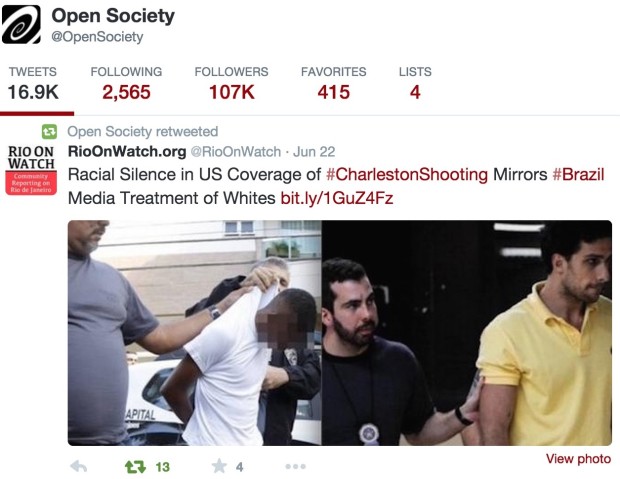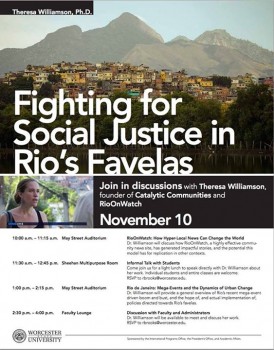2015 Update & Next Up in 2016
December 21, 2015 — As 2015 draws to a close, we at Catalytic Communities would like to express our huge thanks to everyone who has made our work possible during this critical year for Rio and its favelas. The year between the 2014 World Cup and 2016 Olympics saw policy after initially hopeful policy–from pacification to public housing–show their true colors as favelas continued bearing the greatest detrimental impacts of the 2016 Games, particularly as the Brazilian economy as a whole turned sour. Over the course of the year, we also saw a re-escalation of public protest. A year that started out slow in global media coverage in the aftermath of the World Cup, ended with extensive coverage in the lead-up to the Olympics. This has brought intense international attention to Rio’s favelas and CatComm has continued to work throughout the year to shape the local and international debate and amplify community voices, while recommending policy alternatives, in order to advance the possibilities for participatory, sustainable development models for informal communities in Rio and beyond.
From this year’s Indiegogo campaign: Over the next year, through August 2016, Rio de Janeiro will be in the global spotlight like it has never been before. Thousands of reporters will descend on the city, charged with producing stories. Many of them will be on Rio’s favelas.
With this comes the opportunity to channel that spotlight in creative and productive ways, facilitating nuanced reporting that destigmatizes these misunderstood communities, often victims of lazy sensational journalism.
This is important because, as our work has shown, good reporting leads to policy changes and outright reversals, compensation increases for residents facing eviction, and dramatic community empowerment. Just as importantly, however, it sets the record straight on Rio’s favelas in a way that paves the way for productive policies.
Here we take a look at CatComm’s highlights of 2015, a year which has seen us relaunch our RioOnWatch news portal in Portuguese and launch our RioONWire favela news wire service, advance the debate around favela qualities and language, and shape the media narrative of Rio’s favelas on a global scale. However, human rights abuses and forced evictions continue as preparations for the 2016 Olympics have taken on an aggressive pace and our work supporting Rio’s favelas will likely never be as critical as over these coming eight months.
Note that everything listed here was accomplished on a super efficient budget of just $100,000, thanks to 10,800 hours of our amazing interns’ time, in addition to over 100 dedicated and talented volunteers, translators, collaborators, and our core staff of five. We would also love your input on our progress. And your support is what makes it all possible, so please consider making a donation now.
Here are the highlights from 2015:
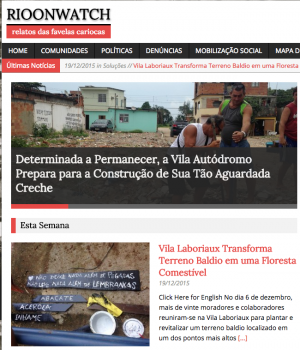 Launched new RioOnWatch site–This year CatComm launched the new RioOnWatch.org.br site to match the full English news portal in time for the one-year-to-go to the Olympics media frenzy of August. January 2015 was the first month since its founding that the Portuguese version of RioOnWatch received more views than the English version, repeated in four more months of the year. Having grown from a small blog platform for our community journalism students’ work in 2010 to an internationally recognized favela news and research source today, the new site was developed to make the breadth of contributions from community journalists and international observers on the urban transformation of Rio fully accessible. Since its launch in 2010 RioOnWatch.org has documented the rapid change taking place in Rio’s favelas in 1442 inter-linked articles that paint a broad and focused picture of the changes underway in the city from favela perspectives, a model which is increasingly recognized for exemplifying how hyper-local news can change the world. This year we saw growth in both reach and quality of output, publishing 390 articles, 37 by favela-based journalists and activists, and our social media reach averaged 138,000 per month in comparison to 119,000 in 2014–despite that being the year that saw our all-time largest reach of 236,000 during the June World Cup protests. Since its inception, RioOnWatch has published contributions by 371 writers and has benefited from 52 translators, almost entirely through in-kind (volunteer) contributions of talent, time and support. Numerous volunteer contributions were also made this year to RioOnWatchTV and our Flickr photography feed.
Launched new RioOnWatch site–This year CatComm launched the new RioOnWatch.org.br site to match the full English news portal in time for the one-year-to-go to the Olympics media frenzy of August. January 2015 was the first month since its founding that the Portuguese version of RioOnWatch received more views than the English version, repeated in four more months of the year. Having grown from a small blog platform for our community journalism students’ work in 2010 to an internationally recognized favela news and research source today, the new site was developed to make the breadth of contributions from community journalists and international observers on the urban transformation of Rio fully accessible. Since its launch in 2010 RioOnWatch.org has documented the rapid change taking place in Rio’s favelas in 1442 inter-linked articles that paint a broad and focused picture of the changes underway in the city from favela perspectives, a model which is increasingly recognized for exemplifying how hyper-local news can change the world. This year we saw growth in both reach and quality of output, publishing 390 articles, 37 by favela-based journalists and activists, and our social media reach averaged 138,000 per month in comparison to 119,000 in 2014–despite that being the year that saw our all-time largest reach of 236,000 during the June World Cup protests. Since its inception, RioOnWatch has published contributions by 371 writers and has benefited from 52 translators, almost entirely through in-kind (volunteer) contributions of talent, time and support. Numerous volunteer contributions were also made this year to RioOnWatchTV and our Flickr photography feed.
 Launched RioONWire, world’s first favela newswire: Different from our regular @RioOnWatch Twitter feed (for general news, in English and Portuguese, including retweets and conversations), our @RioONWire Twitter feed was launched on April 1 and functions as a traditional Wire service (think Bloomberg, Reuters or CNN scrolling updates along the bottom of your screen or in Times Square) but focused on favelas and real-time news, in English, and with some extra punch: after every NEWS, BREAKING or EVENT item, you’ll find tweets offering BACKGROUND, CONTEXT, CONTACT information, and more, to help you understand and contextualize that original news item. Anyone, anywhere, can follow in real-time, the latest news from Rio’s favelas, in English. And journalists spending only a short period in Rio can easily access worthwhile stories and understand the context behind changes occurring in the city. In just over 8 months, RioONWire has tweeted 6400 times and has grown to 433 followers including dozens of highly influential journalists covering Rio.
Launched RioONWire, world’s first favela newswire: Different from our regular @RioOnWatch Twitter feed (for general news, in English and Portuguese, including retweets and conversations), our @RioONWire Twitter feed was launched on April 1 and functions as a traditional Wire service (think Bloomberg, Reuters or CNN scrolling updates along the bottom of your screen or in Times Square) but focused on favelas and real-time news, in English, and with some extra punch: after every NEWS, BREAKING or EVENT item, you’ll find tweets offering BACKGROUND, CONTEXT, CONTACT information, and more, to help you understand and contextualize that original news item. Anyone, anywhere, can follow in real-time, the latest news from Rio’s favelas, in English. And journalists spending only a short period in Rio can easily access worthwhile stories and understand the context behind changes occurring in the city. In just over 8 months, RioONWire has tweeted 6400 times and has grown to 433 followers including dozens of highly influential journalists covering Rio.
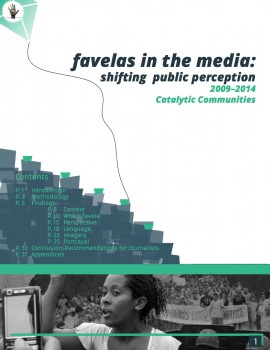 ‘Favelas in the Media’ Report Published: Our ‘Favelas in the Media: 2009-2014’ report studies how six mainstream English-language news outlets from the United States and the United Kingdom report on Rio’s favelas. From the awarding of the 2016 Olympics to Rio in 2009 through to the 2014 World Cup, we tracked 329 articles from The New York Times, The Wall Street Journal, USA Today, The Guardian, The Daily Mail, and The Telegraph. Unsurprisingly, due to the unique global media spotlight created by the mega-events, Rio’s historically stigmatized favelas have received unprecedented levels of attention during this period. Our results find that although mainstream coverage of favelas has grown dramatically and continues to emphasize negative aspects of favelas, the increased diversity and number of articles exploring these communities has provided greater platforms for resident voices and positive stories. Download the full PDF report here. The report is currently being expanded to include six additional publications and fully cover the period 2008-2016.
‘Favelas in the Media’ Report Published: Our ‘Favelas in the Media: 2009-2014’ report studies how six mainstream English-language news outlets from the United States and the United Kingdom report on Rio’s favelas. From the awarding of the 2016 Olympics to Rio in 2009 through to the 2014 World Cup, we tracked 329 articles from The New York Times, The Wall Street Journal, USA Today, The Guardian, The Daily Mail, and The Telegraph. Unsurprisingly, due to the unique global media spotlight created by the mega-events, Rio’s historically stigmatized favelas have received unprecedented levels of attention during this period. Our results find that although mainstream coverage of favelas has grown dramatically and continues to emphasize negative aspects of favelas, the increased diversity and number of articles exploring these communities has provided greater platforms for resident voices and positive stories. Download the full PDF report here. The report is currently being expanded to include six additional publications and fully cover the period 2008-2016.
- Monthly Favela News Digests: Compiling and tracking all English-language media coverage of favelas from month to month, we continued to make this research available in a meticulously crafted monthly summary for easy reading. Sign up here to receive these digests in your inbox or click to review this year’s digests here:
November: Black Awareness | Gender | Resistance & Celebration
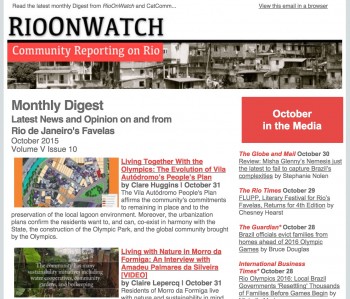 October: Segregation | Raise Your Voice | Designed to Live Together
October: Segregation | Raise Your Voice | Designed to Live Together
September: Police x Social Media | Stigma | Affordable Housing
August: One Year to Go to #Rio2016 | Best/Worst Media | Participation
July: Olympic Evictions | Good News in Housing & Organizing | Help Us
June: Lightning Evictions | Sustainability | Collective Leadership
May: Evictions & Demolitions | Police Violence | Slavery History
April: Pacification Tensions | Housing Crisis | Sustainability
March: Broken Olympic Promises | Sustainability & Tech | Women’s Day
February: Carnival | Police & protests | Community solutions
January: Slavery & the Port | Land compensation & tenure | Language
- Media Monitoring and Community Journalism Initiative: In addition to the results of our Media Monitoring work yielding the ‘Favelas in the Media’ report and monthly digests, we also take advantage of the RioOnWatch platform to publish articles that call attention to the current status of the qualitative vs. unproductive nature of journalism covering favelas. This year we published the article One Year to Go: Best and Worst Reporting on Favelas and the Olympics, calling attention to the coverage around the August 5 landmark representing one year until the 2016 Games. We also issued a new topic on RioOnWatch for community responses to the traditional media narrative on favelas.
- Alternative Press Conferences: In parallel to the official Rio2016 World Press Briefing October 5-8, CatComm held two alternative Rio 2016 press events for international journalists. Presentations from Executive Director Theresa Williamson and Olympics historian Jules Boykoff offered local and global context for the Olympics and proposed key questions for the Mayor and IOC respectively. Candomblé practitioner and former Vila Autódromo resident Heloisa Helena Costa Berto shared her story of eviction from her long-time home and sacred site. Earlier in the year, on May 7 CatComm held a correspondents’ Wine and Cheese launch of @RioONWire for two dozen high profile media based in Rio, initiating a conversation about the role and responsibility of productive coverage of Rio’s favelas.
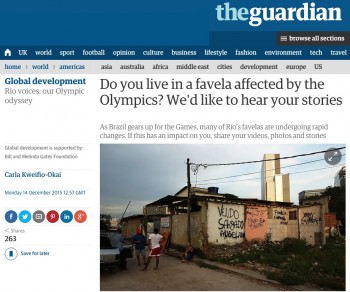 Victory for Favela Voices in the Media: We were thrilled to see a huge shift in 2015 towards community voices being directly represented in the global media. Since 2010 we had detected a significant growth in the percentage of articles on Rio quoting favela residents through our ‘Favelas in the Media‘ research. This year, however, we saw a noticeable jump in favela residents reporting themselves, or articles specifically focusing on community initiatives. Most notable is The Guardian‘s ‘View from the Favelas’ series, where a number of community journalists are reporting directly through the globally reputable and widely read platform. There have, in addition, been a number of reports, ranging from The New York Times and New York Times Magazine to Fusion, among others, reporting on favela qualities and initiatives by emphasizing the work of community protagonists. We have also seen media outlets become more sophisticated in their explanations and contextualization of favelas, away from ‘slum’ language.
Victory for Favela Voices in the Media: We were thrilled to see a huge shift in 2015 towards community voices being directly represented in the global media. Since 2010 we had detected a significant growth in the percentage of articles on Rio quoting favela residents through our ‘Favelas in the Media‘ research. This year, however, we saw a noticeable jump in favela residents reporting themselves, or articles specifically focusing on community initiatives. Most notable is The Guardian‘s ‘View from the Favelas’ series, where a number of community journalists are reporting directly through the globally reputable and widely read platform. There have, in addition, been a number of reports, ranging from The New York Times and New York Times Magazine to Fusion, among others, reporting on favela qualities and initiatives by emphasizing the work of community protagonists. We have also seen media outlets become more sophisticated in their explanations and contextualization of favelas, away from ‘slum’ language.
- One Year to Go: On August 5, with ‘One Year to Go’ to the Rio 2016 Olympic Games, we hosted an open Q&A on Twitter and Facebook using #1Yr2GoQnA with two of the most vocal women advocating for a positive legacy from the Rio 2016 Games: Catalytic Communities‘ Executive Director Theresa Williamson, and journalist and author of Dancing with the Devil in the City of God, Juliana Barbassa. We also provided live commentary on the BBC World Service.
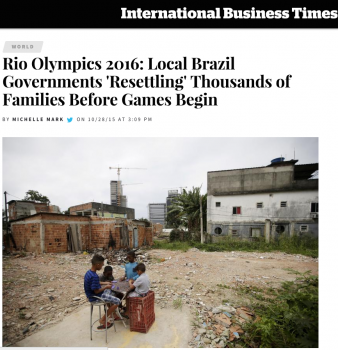 Shaping the International Debate Through Media: International journalists covering Rio de Janeiro and the favelas have sought CatComm out throughout the year for information, interviews and support, and we’ve strategically used these opportunities to educate them on favela communities’ efforts, the importance of participatory policies and community voices in coverage, encouraging journalists to be nuanced and accurate in their reporting. Examples this year include an Opinion piece on the value of collective models of titling in favelas for Architectural Review; a number of pieces on evictions in The Guardian, Vice, The International Business Times, US News and World Report, as well as TV Folha in Brazil and Swedish television SVT; and articles dissecting broader urban phenomena like race in Global Post, inequality in CityLab, the Trump Hotel and its relationship to Rio’s inequality in The New York Times, and Olympic housing in The Guardian. In December we celebrated as CatComm provided the support which resulted in an important and timely TIME magazine piece about the brutal eviction at Vila Autódromo. Entitled, “Meet the Impoverished Brazil Residents Who Won’t Move for the Olympics,” Sean Gregory’s piece came at a critical time for the community: just as the City had demolished the last house marked for eminent domain, and pressure mounted on remaining families to leave their homes.
Shaping the International Debate Through Media: International journalists covering Rio de Janeiro and the favelas have sought CatComm out throughout the year for information, interviews and support, and we’ve strategically used these opportunities to educate them on favela communities’ efforts, the importance of participatory policies and community voices in coverage, encouraging journalists to be nuanced and accurate in their reporting. Examples this year include an Opinion piece on the value of collective models of titling in favelas for Architectural Review; a number of pieces on evictions in The Guardian, Vice, The International Business Times, US News and World Report, as well as TV Folha in Brazil and Swedish television SVT; and articles dissecting broader urban phenomena like race in Global Post, inequality in CityLab, the Trump Hotel and its relationship to Rio’s inequality in The New York Times, and Olympic housing in The Guardian. In December we celebrated as CatComm provided the support which resulted in an important and timely TIME magazine piece about the brutal eviction at Vila Autódromo. Entitled, “Meet the Impoverished Brazil Residents Who Won’t Move for the Olympics,” Sean Gregory’s piece came at a critical time for the community: just as the City had demolished the last house marked for eminent domain, and pressure mounted on remaining families to leave their homes.
- Conference on World Affairs: CatComm Executive Director Theresa Williamson was invited to present at the University of Colorado – Boulder’s highly regarded historic Conference on World Affairs in April 2015. We recommend listening to the 10-minute segment followed by an hour-long interview on KGNU radio, along with all the panels on which she participated:
April 10, 2015: Poverty Reduction: It’s a Small World After All [USA-EN]
April 10, 2015: Humanitarian Intervention: When to Get Involved [USA-EN]
April 9, 2015: Burning Issues in Latin America [USA-EN]
April 8, 2015: NGOs: High Risk, High Reward [USA-EN]
April 7, 2015: Catalyzing Marginalized Communities in Latin America by Joe Richey [USA-EN]
April 7, 2015: Global Drug Supply, Legal and Illegal [USA-EN]
April 7, 2015: Lessons on Unsustainable Cities [USA-EN]
 Favela as a Sustainable Model: Continuing with our long-term program to expand awareness about favela qualities as they relate to the potential favelas offer as models of sustainable and vibrant community development, in 2015 CatComm expanded our coverage of favela-based sustainability initiatives on RioOnWatch, began to pick up steam with our Rede Favela Sustentável Facebook group, filmed and supported the establishment of a biodigester-based sewerage system in Vale Encantado, and were invited to discuss our award-winning 2012 film Favela as a Sustainable Model at the National Social and Environmental Sustainability Conference in Porto Alegre, Brazil. Finally, CatComm Executive Director Theresa Williamson was invited to present on Favelas as Sustainable Models at the Ecocity World Summit in Abu-Dhabi in October.
Favela as a Sustainable Model: Continuing with our long-term program to expand awareness about favela qualities as they relate to the potential favelas offer as models of sustainable and vibrant community development, in 2015 CatComm expanded our coverage of favela-based sustainability initiatives on RioOnWatch, began to pick up steam with our Rede Favela Sustentável Facebook group, filmed and supported the establishment of a biodigester-based sewerage system in Vale Encantado, and were invited to discuss our award-winning 2012 film Favela as a Sustainable Model at the National Social and Environmental Sustainability Conference in Porto Alegre, Brazil. Finally, CatComm Executive Director Theresa Williamson was invited to present on Favelas as Sustainable Models at the Ecocity World Summit in Abu-Dhabi in October.
- Community Debates: This year CatComm led two sets of community debates at Columbia University’s Studio X in Rio. The first in March in partnership with Pratt Institute professors Perry Winston and Leonel Ponce, which involved a week-long immersion of Pratt graduate architecture students in four Rio favelas, followed by a dynamic workshop and exchange about community organizing in New York and Rio with the Pratt students and community leaders from a range of Rio favelas. The second an informal brainstorm and gathering with a diverse group of favela leaders to discuss the impacts of favela stigma on their lives and how we can collectively work to address this collective concern in 2016.
-
University Talks: In November 2015, CatComm’s Executive Director Theresa Williamson gave talks at the following US universities: Swarthmore College, Vanderbilt University, Smith College, Worcester State University, Claremont McKenna College, Kalamazoo College, Western Michigan University, and the University of Wisconsin-Madison. Giving talks–on the dynamics of urban change in Rio today; hyperlocal news reporting and how it can change the world; community responses to evictions, gentrification and police violence; and rethinking our assumptions about favelas and sustainable development–Theresa engaged hundreds of college students across the US in the processes underway in Rio and CatComm’s work, recruited new interns and organized educational visits and research with university departments.
- Educational Community Visits: CatComm facilitated 13 educational community visits on behalf of major international universities and learning institutions this year, giving participants a unique, community-led insight into the favela. Groups included the University of North Carolina’s Kenan-Flagler Business School, Pratt Institute, The American University, Maquarie University, CIEE and WorldStrides Capstone Programs.
- Research & Series: Besides our ‘Favelas in the Media’ longitudinal research study, CatComm’s main research efforts this year involved supporting researchers, including Masters, Doctoral, and academics producing books, including researchers from: Massachusetts Institute of Technology (MIT), Duke University, Pacific University of Oregon, University of California at Santa Cruz, University of Amsterdam, University of Leuven, the University of Brighton, and Chulalongkorn University (Bangkok). Early in the year CatComm collaborated with researchers at MIT to produce an influential article updating their prior research on the situation at Vila Autódromo. CatComm ended the year providing support to Jules Boykoff’s upcoming book on the history of the Olympics. In addition to support of researchers, CatComm published a wide range of in-depth, research-led articles and series on RioOnWatch, including on the UPP favelas, Favela Language, Democracy through Technology, Rio’s metropolitan region, the history of the Port region, and a series of contributions for Blog Action Day 2015 on the theme of ‘Raise Your Voice’ in October, World Cities Day in October, Brazil’s Black Awareness Month in November, and Human Rights Day in December. Our research and RioOnWatch publications have consistently sought to push forward the debate on policies affecting favelas and the urban transformation of Rio, with articles this year providing in-depth critiques of policies including health policies and the UPP Social program.
- Appeals for Community Programs: A regular feed on the RioOnWatch site now is the ‘Opportunities to Support Favelas‘ section, featuring community initiatives currently in need of support and making international support easy through a CatComm fiscal sponsorship.
Our Plans for 2016:
We have now built out all the ingredients–the networks, platforms, content–and established the reputation we need to scale our impact through the Rio Olympic Games, to take place in August 2016. Our single-pointed focus during these coming months is to take advantage of the one-in-a-kind opportunity afforded Rio by the global spotlight in the lead-up to the Olympic Games, to address the underlying enabler of poor policy towards favelas: stigma.
In continuing to apply our multi-year 4-Prong Strategy of (1) Strategic training and networking favela activists with broad networks of support, (2) Broadly communicating the issues and values of the favela based on community perspectives, (3) Developing and proving the value of participatory planning methodologies; and (4) Advocating on behalf of inclusive, integrative and participatory policies; with your continued support in 2016 CatComm will:
- RioOnWatch and RioONWire: Maintain and expand the two services to make them even more proactive, responsive and dynamic, engaging in issues from the very beginning and helping influence the quality of media produced on major issues affecting favelas. This includes RioOnWatchTV and @RioOnWatchLIVE. We will actively encourage repurposing of RioOnWatch and CatComm content in 2015 (i.e. syndication).
- #StopFavelaStigma: Facilitate a global campaign to #StopFavelaStigma working with community organizers in Rio to source destigmatizing messages, stories, photography and video and engage the Rio (and global) public in a dialogue about the sources and impacts of such widespread stigma. This campaign will involve a unique Facebook page, ongoing hashtag campaign with weekly ‘stigmas to respond to’ and monthly debates in Columbia University’s Studio X in Rio.
- Olympics Resources for Journalists: With tens of thousands of journalists coming to Rio to cover the Olympics, we will provide a ‘packet’ of vital background information, context, fact sheets and contact/story information from our broad community network to journalists arriving in Rio, expanding on what we did in 2014, alongside our @RioONWire service and general Journalist Support. We will also hire a bus to conduct a ‘Reality Tour’ for journalists the week prior to the 2016 Games. This program builds on our World Cup Journalism Strategy.
- Community Journalism Initiative: In addition to publishing more community voices (journalistic articles and opinions) on RioOnWatch itself, we will support the growing trend of community journalists appearing directly in international outlets, through advocating for them and facilitating mainstream media’s access to community news producers, as well as recommending strategies for engagement.
- ‘Reality Tours’: In July during the World Planning Schools Congress to be held in Rio, and in the lead-up to the Olympics in August, we will hire buses and conduct ‘Reality Tours’ for interested planners and journalists participating in both events, visiting diverse favelas and meeting with local leaders, with themes like evictions and favela innovation.
- Housing and ‘Right to the City’ Policy Proposal: Publish a policy proposal focused on housing and ‘right to the city’ governance, including in mainstream Rio news outlets, stimulating debate in Rio prior to October’s municipal elections and requesting a response from Mayoral candidates.
- Media Analysis and ‘Favelas in the Media’ Report: Our ‘Favelas in the Media: 2009-2014’ report is currently being expanded beyond the original six publications and limited time period, to twelve publications and all articles on favelas from 2008-2016. Post-Olympics we will finalize the study and publish the results, hoping to see a positive change and also using the report as a tool to engage media outlets in more productive coverage of favelas.
- RioOnWatch Replication Manual: How did RioOnWatch start, expand, and make an impact? What are the critical ingredients in this model? From minute details of how we utilize social media and galvanize large numbers of contributors and translators, to broader philosophical questions of strategy and impact, post-Olympics CatComm plans to prepare a Manual that organizers around the world can use to create their own hyperlocal-to-global impact news site.
- Favela Perceptions Survey: Since 2010 CatComm has been undertaking annual research in large English-speaking cities worldwide regarding perceptions of Rio’s favelas. This research will be conducted one last time in 2016, followed by calculations and a report summarizing findings from 2010-2016.
- Catalytic Communities’ Organizational Model Case Study: Our organizational model is increasingly raising interest. We are asked many questions, from ‘how we do so much with little,’ to ‘why aren’t there other organizations filling the same niche elsewhere?’ In the interest of reflecting on our 15 years of work and contributing to the literature on nonprofit models and strategies, we will work with partners to produce a case study or book addressing a wide range of questions and providing tools for implementing some of our approaches.
Twitter Testimonials 2015

